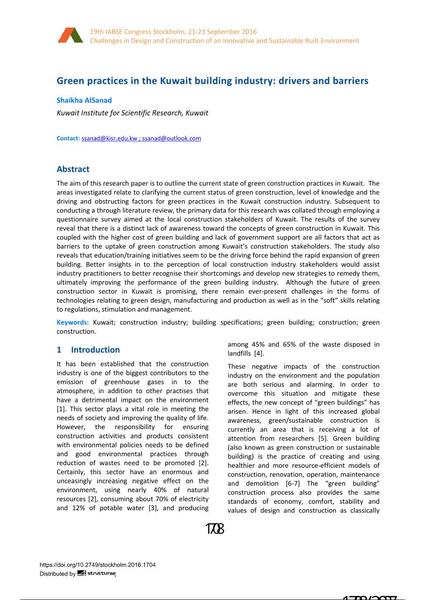Green practices in the Kuwait building industry: drivers and barriers

|
|
|||||||||||
Détails bibliographiques
| Auteur(s): |
Shaikha Abdulattef AlSanad
(Kuwait Institute for Scientific Research, Kuwait)
|
||||
|---|---|---|---|---|---|
| Médium: | papier de conférence | ||||
| Langue(s): | anglais | ||||
| Conférence: | IABSE Congress: Challenges in Design and Construction of an Innovative and Sustainable Built Environment, Stockholm, Sweden, 21-23 September 2016 | ||||
| Publié dans: | IABSE Congress Stockholm, 2016 | ||||
|
|||||
| Page(s): | 1708-1715 | ||||
| Nombre total de pages (du PDF): | 8 | ||||
| Année: | 2016 | ||||
| DOI: | 10.2749/stockholm.2016.1704 | ||||
| Abstrait: |
The aim of this research paper is to outline the current state of green construction practices in Kuwait. The areas investigated relate to clarifying the current status of green construction, level of knowledge and the driving and obstructing factors for green practices in the Kuwait construction industry. Subsequent to conducting a through literature review, the primary data for this research was collated through employing a questionnaire survey aimed at the local construction stakeholders of Kuwait. The results of the survey reveal that there is a distinct lack of awareness toward the concepts of green construction in Kuwait. This coupled with the higher cost of green building and lack of government support are all factors that act as barriers to the uptake of green construction among Kuwait’s construction stakeholders. The study also reveals that education/training initiatives seem to be the driving force behind the rapid expansion of green building. Better insights in to the perception of local construction industry stakeholders would assist industry practitioners to better recognise their shortcomings and develop new strategies to remedy them, ultimately improving the performance of the green building industry. Although the future of green construction sector in Kuwait is promising, there remain ever-present challenges in the forms of technologies relating to green design, manufacturing and production as well as in the “soft” skills relating to regulations, stimulation and management. |
||||
